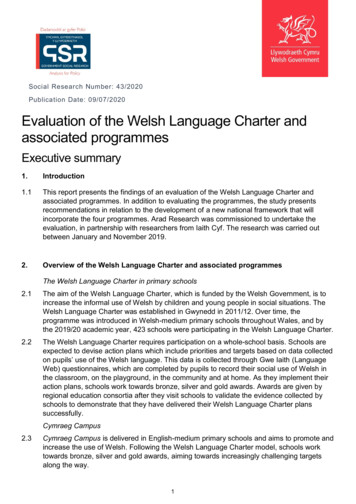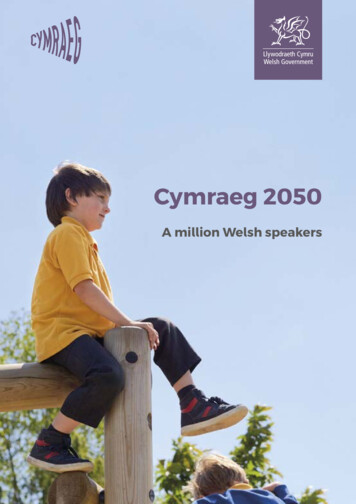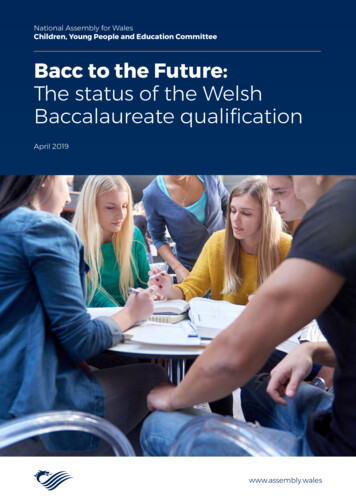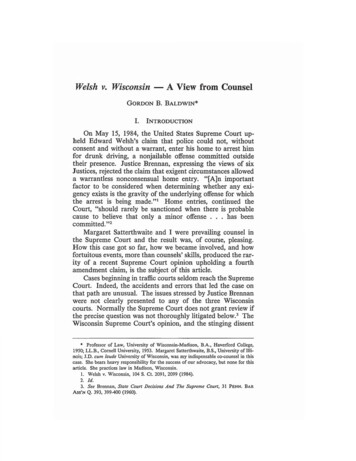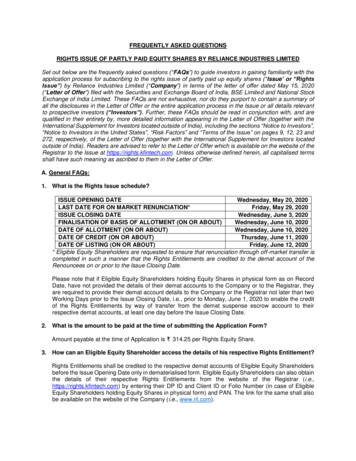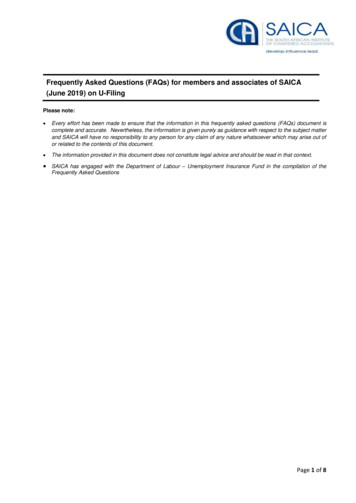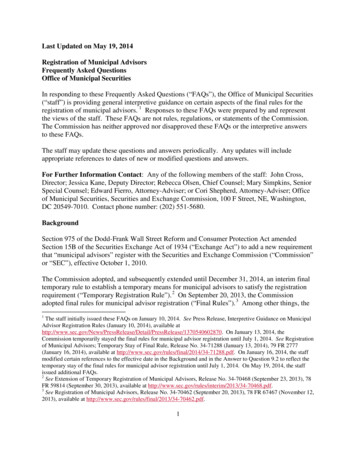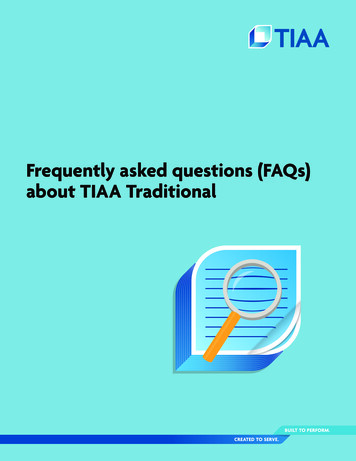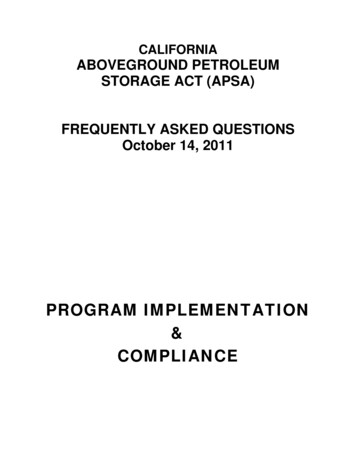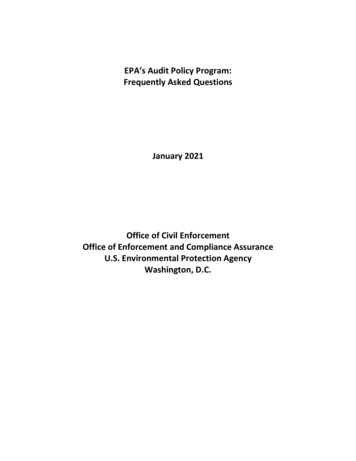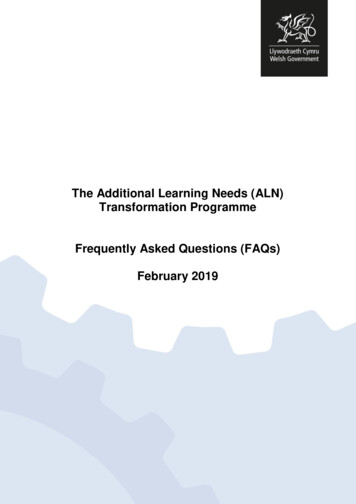
Transcription
The Additional Learning Needs (ALN)Transformation ProgrammeFrequently Asked Questions (FAQs)February 2019
This document provides answers to some of the most frequently askedquestions about the Additional Learning Needs and Education Tribunal(Wales) Act 2018 and the wider ALN Transformation Programme.The Act and wider programme will transform the separate systems for specialeducational needs (SEN) in schools and learning difficulties and/or disabilities(LDD) in further education to create a unified system for supporting learnersfrom 0 to 25 with ALN.The questions are grouped under the following areas: The new system2 IDPs3 Welsh Language6 Key roles7 Disagreement resolution and appeals8 Children and young people in particular circumstances10 Post-16 specialist placements11 Implementation12For further information about the ALN Act and Transformation Programmeplease visit https://gov.wales/aln.
The new system1.What is the new additional learning needs (ALN) system?The ALN system is the new statutory support system for children and youngpeople aged 0 to 25 in Wales with ALN that is due to come into force inSeptember 2020.The legislative framework of the new system is created by the AdditionalLearning Needs and Education Tribunal (Wales) Act 2018 (‘the Act’), the ALNCode for Wales and regulations made under the Act. Through this statutoryframework the Welsh Government aims to ensure that all learners with ALNare supported to overcome barriers to learning and can achieve their fullpotential, by creating: a unified legislative framework to support all children of compulsory schoolage or below with additional learning needs (ALN) and to support youngpeople with ALN who are in school or further education (FE); an integrated, collaborative process of assessment, planning andmonitoring of the support provided to ALN learners which facilitates early,timely and effective interventions; and a fair and transparent system for providing information and advice, and forresolving concerns and appeals.The Act replaces the terms ‘special educational needs (SEN)’ and ‘learningdifficulties and/or disabilities (LDD)’ with the new term ‘additional learningneeds (ALN)’. All children and young people with ALN regardless of theseverity or complexity of their learning difficulty or disability will be entitled to astatutory support plan called an ‘Individual Development Plan’ (IDP). Childrenand young people with ALN will receive support called additional learningprovision (ALP) which will be set out in their IDP.2.What is ALN?A learner has ALN if he or she has a learning difficulty or disability which callsfor additional learning provision (ALP).A child of compulsory school age or person over that age has a learningdifficulty or disability if he or she:(a) has a significantly greater difficulty in learning than the majority ofothers of the same age, or(b) has a disability for the purposes of the Equality Act 2010 whichprevents or hinders him or her from making use of facilities foreducation or training of a kind generally provided for others of the sameage in mainstream maintained schools or mainstream institutions in thefurther education sector.A child under compulsory school age has a learning difficulty or disability if heor she is likely to (or would be likely to if no ALP were made) have significantlygreater difficulty in learning than the majority of their peers when they reachcompulsory school age.2
ALP for a learner aged over 3 years means educational or training provisionthat is additional to, or different from, that made generally for others of thesame age in a mainstream school, FEI or nursery education setting In Wales.For those under 3 years old it means educational provision of any kind.It is possible for a child or young person to have a learning difficulty ordisability that does not call for ALP. In these instances such a child or youngpeople would not be considered to have ALN. Further it is important to notethat not all learning difficulties or disabilities that arise from a medical conditionwill call for additional learning provision.Chapter 7 of the draft ALN Code provides guidance on the process forassessing and deciding whether a child or young person has ALN.IDPs3.Who will be entitled to an IDP?The ALN Act creates a single legislative system for supporting children andyoung people aged between 0 to 25 years who have ALN. This is instead ofthe two separate systems currently operating to support children and youngpeople of compulsory school age who have SEN, and young people in furthereducation who have LDD.The new system replaces existing support plans (including Statements ofSEN, individual education plans (IEPs) for learners on school action/ schoolaction plus. and Learning and Skills Plans for post-16 learners) with a newstatutory plan called an Individual Development Plan (IDP).However, the Act does not give young persons with ALN a right to continuouseducation up to that age. Rather, it is about providing access to furthereducation or training on an equitable basis to persons who do not have ALN.If a young person has ALN and attends a maintained school or FEI, they willalways be entitled to an IDP. However, where a young person with ALN is notattending an FEI or maintained, a local authority will need to decide, inaccordance with regulations to be made under the Act, whether it is necessaryto maintain an IDP for them.It is intended that the regulations will set out matters that are relevant when alocal authority is considering what, if any, reasonable needs for education ortraining the young person has. They will also deal with when it is necessary forthe local authority to prepare and maintain an IDP for a young person who hasa reasonable need for education or training. Chapter 12 of the draft ALNCode reflect what we intend to provide for in these regulations.The Act does not extend to higher education, work-based learning orapprenticeships. The Welsh Government believes that it would not beappropriate to place duties on employers. If however a learner undertakingwork-based learning or an apprenticeship is enrolled as a student at an FEI,the duties on the FEI apply. Also, if the young person agrees for the IDP to3
transfer with them to their higher education institution, work-based learningprovider or apprenticeship it can be used for transition and to supportplanning. We are continuing to work with colleagues responsible forapprenticeships and work-based learning to identify the different scenariosand suggest best practice for dealing with them in the Code.We believe effective use of contractual arrangements is the better way ofprotecting and promoting the interests of learners with ALN within the workbased learning sector.4.How long does it take to prepare an IDP?The time taken to prepare an IDP will depend on the nature and scope of achild or young person’s needs. Preparing a concise IDP for a child or youngperson with less severe or complex needs should be a relatively simple andquick process. Such IDPs should form a large majority of those that areprepared. An IDP for a child or young person with severe, complex or lowincidence needs is likely to require specialist input and advice and detail amuch wider range of interventions. This will necessarily require greater timeand effort to prepare but should only be required in a minority of cases.The draft ALN Code proposes that a school must prepare an IDP promptly,and in any event within 35 schools days from, in the case of a pupil who is achild, it being brought to the attention of or otherwise appearing to the schoolthat person may have ALN, or, in the case of a pupil who is a young person,the pupil consenting to the decision being made. The equivalent period in thecase of a local authority is 12 weeks (or seven weeks where the local authorityis reconsidering a school’s decision about whether a child or young personhas ALN).Under the current SEN system, the process of statutory assessment andissuing a statement can take up to 26 weeks. The proposed timescales forIDPs should help ensure that no child or young person with ALN goes formuch longer than a whole school term without an IDP being put in place (aschool term normally lasting about 13 weeks).5.What is an IDP and how does it differ to a Statement?An IDP is a statutory plan maintained by a school, FEI or local authority thatsets out a description of a child or young person’s ALN, the additional learningprovision (ALP) called for by their learning difficulty or disability, and otherassociated information.Unlike a statement of SEN, IDPs will be provided to children and young peoplewith ALN irrespective of the severity or complexity of their needs. Thestatutory status of the IDP will be the same irrespective of the child or youngperson’s needs, with the same rights of appeal to the Education Tribunal forWales for anyone with an IDP.4
The IDP is intended to be a flexible document that will vary in length andcomplexity depending on the different needs of learners and the way in whichan individual learner’s needs develop and change over time.6.How different is this Act to the one in England?In England, the Children and Families Act 2014 reformed the SEN system andintroduced new statutory plans called ‘Education Health and Care Plans’(EHCPs) – however, these are only for learners with severe and complexneeds (i.e. equivalent to Statements). In Wales, the ALN system will extendrights to statutory plans to all learners with ALN, not limited to only those withthe most severe or complex needs.7.What role do children, their parents, and young people have in theprocess of identifying and supporting ALN in the new system?The new system puts the learner at the heart of everything that happens andwe expect schools, FEIs and local authorities to take a person-centredapproach to planning for and supporting children and young people.The Act requires that the views, wishes and feelings of children, their parentsand young people are considered at all stages of the IDP process. Theproposed mandatory IDP template will include a one-page profile to ensurethat IDPs reflect the child’s or young person’s needs and personality, includingwhat is important to and for them.8.Who is responsible for preparing, maintaining and reviewing IDPsand for identifying ALN?ALN will be identified, and IDPs will be prepared and maintained, by either aschool, FEI or local authority, depending on which educational institution achild or young person attends and the severity or complexity of their needs.Maintaining an IDP means, securing the additional learning provision includedin it, and reviewing the IDP as and when required to ensure the information init, and the provision it describes, remains appropriate.In the case of children or young people who are not a pupil at a maintainedschool or enrolled as a student at an FEI, or where they are a child lookedafter by a Welsh local authority, it will always be the local authority thatmaintains the IDP. This includes maintaining IDPs for children undercompulsory school age if they are not attending a maintained school setting oryoung people attending an independent specialist post-16 institution.9.Will there be a mandatory national IDP template?The Act requires that the ALN Code includes one or more standard forms ofIDP and requires governing bodies and local authorities to use this form orforms.5
All IDPs will contain certain key elements and have the same basic structure.This will ensure broad consistency and equality in terms of the way thatlearners are treated and will underpin the cohesion of the ALN system as awhole and the portability of individual plans.The draft Code provides two mandatory IDP forms, one for use in the case ofchildren who are not looked after by a local authority, and all young people;and another for use in the case of children who are looked after by a localauthority. The headings and order of the mandatory forms reflect the detailedmandatory IDP content set out in Chapter 13 and 14 of the draft ALN Code.10. What is the difference between a local authority-maintained IDP anda school-maintained IDP?An IDP maintained by a school and that maintained by a local authority willhave exactly the same statutory standing. Whichever body prepares andmaintains the IDP must ensure that the IDP describes the child or youngperson’s ALN and the ALP that is called for by their ALN, and must thensecure that ALP.Local authorities rather than schools will maintain IDPs where the child oryoung person has ALN that calls for ALP it would not be reasonable for thegoverning body to secure.Chapter 9 of the draft ALN Code provides clarity on when a school shouldrefer a pupil to a local authority for it to decide whether the pupil has ALN andto decide whether the local authority or the school should have responsibilityfor maintaining an IDP. It provides guidance to local authorities on how theyshould determine whether it is reasonable for a school or the local authority tosecure the ALP required by a child or young person. It also sets out that thelocal authority should establish a set of principles they will apply whendetermining whether it is reasonable for a school to secure the ALP or whetherthe local authority ought to do so.Welsh Language11. How will the Act help to create a bilingual system for supportingchildren and young people with ALN across Wales?One of the core aims of the Act is to create a bilingual system of support forALN. Services will be required to consider whether a child or young personneeds ALP in Welsh; this duty will be an ongoing one, rather than a one-offdecision. If they do, this must be documented in the IDP and ‘all reasonablesteps’ must be taken to secure the provision in Welsh. A mechanism isincluded in the Act to remove by regulations the ‘all reasonable steps’ test, sothat the duties to provide ALP through the medium of Welsh become absoluteover time.A series of strategic duties are also aimed at driving progress towards abilingual ALN system. In particular, when reviewing their arrangements forALN, wand the extent to which those arrangements are sufficient to meet the6
needs of children and young people, local authorities will be required toconsider the sufficiency of ALP made in Welsh. If a local authority considersthat the arrangements are not sufficient, including the availability of ALP inWelsh, it must take all reasonable steps to remedy the matter.In doing so, local authorities should link their review of ALP with widerstrategic duties including those under the School Standards and Organisation(Wales) Act 2013, which requires them to draft, consult on and publish Welshin Education Strategic Plans (WESPs) demonstrating how they will aim toachieve the outcomes and targets for Welsh-medium provision in their area,including for learners with ALN.Key roles12. What is the Additional Learning Needs Co-ordinator (ALNCo) roleand how does this differ to existing SENCos?The ALNCo is a statutory role which will replace the existing non-statutorySENCo role that exists in most maintained schools in Wales and similar nonstatutory roles that are undertaken in FEIs in Wales.Section 60 of the Act requires FEIs and mainstream maintained schools,including maintained nurseries and pupil referral units to have a designatedALNCo. However this excludes maintained special schools where every staffmember will have a focus on ALN.The ALNCo is the individual who at a strategic level within a school or FEIensures the needs of all learners with ALN within the education setting aremet. The role is a strategic one within the education setting and shouldtherefore, either form part of the senior leadership team or have a clear line ofcommunication to the senior leadership team. This will support the setting toplan, manage and deliver its duties and responsibilities in identifying andmeeting the needs of children and young people with ALN.The draft Additional Learning Needs Co-ordinator (Wales) Regulations 2019prescribe the qualifications and experience required to be an ALNCo and thefunctions placed upon ALNCos.13. What is the Designated Educational Clinical Lead Officer (DECLO)role?The ALN Act places a duty on all local health boards to designate an officer tohave responsibility for co-ordinating the health board’s functions in relation tochildren and young people with ALN. That person is known as the DesignatedEducation Clinical Lead Officer (DECLO).The DECLO must either be a registered medical practitioner or a registerednurse or another health professional. The Local Health Board must onlydesignate an officer as a DECLO it considers to be suitably qualified andexperienced in the provision of health care for children and young people withALN.7
Chapter 15 of the draft Code sets out the proposed role of the DECLO,including:o operating strategically to promote awareness of ALN at executivelevel within the Local Health Board and promote new ways ofworking;o sharing best practice with the other DECLOs to help ensurestandardised approaches across Wales;o promoting a consistent strategic approach within the Local HealthBoard to the identification and assessment of ALN, the preparationand review of IDPs, the planning and delivery of ALP and themonitoring the effect of it on children and young persons;o managing and monitoring compliance with Local Health Boardduties under the Act, and measuring the success of the LocalHealth Board’s interventions.14. What is the Early Years ALN Lead Officer (ALNLO) role?The 2018 Act requires each local authority to designate an Early YearsALNLO, who will have responsibility for co-ordinating the local authority’sfunctions under the Act in relation to children under compulsory school agewho are not attending maintained schools.The role of the Early Years ALNLO is intended to be a strategic one.Responsibilities within the role are expected to include establishing effectivecollaborative working practices and arrangements with others who work withchildren below compulsory school age; raising awareness of the ALN systemand how it applies to children under compulsory school age; promoting earlyidentification and prevention of ALN; and other strategic responsibilities.Chapter 8 of the draft ALN Code provides further detail on the expectations ofthe Early Years ALNLO.Disagreement resolution and appeals15. What happens if a child, parent or young person disagrees with adecision about ALN by a school, local authority or FEI?In the first instance, the child, their parent or young person should ask for thematter to be reconsidered by the body that made the decision.If a school is dealing with the request to reconsider the matter and the child,parent or young person concerned is unhappy with the decision following thereconsideration, they can refer the matter to the local authority.If the child, parent or young person concerned is unhappy with a localauthority’s or FEI’s decision, they can make an appeal to the EducationTribunal for Wales (‘the Tribunal’).8
The child, their parent or the young person will be able to use the localauthority’s dispute resolution arrangements. These arrangements will attemptto resolve disagreements outside of Tribunal proceedings. Using thesearrangements is not compulsory and does not affect a child’s, their parent’s oryoung person’s right to take an appeal to the Tribunal. However, the WelshGovernment wishes to encourage use of these arrangements, as they willgenerally reduce the need to take a dispute to the Tribunal and lead to quickerresolution of disagreements, which would minimise disruption to the child’s oryoung person’s learning and save significant time and money for the partiesinvolved.In addition, the 2018 Act places requirements on local authorities to makearrangements for the provision for independent advocacy services for childrenand young people where they might disagree with a decision.Chapter 7 of the draft ALN Code sets out guidance and requirements relatingto the duties on local authorities to make arrangements for avoiding andresolving disagreements and for the provision of independent advocacyservices.16. What is the remit of the Education Tribunal?The 2018 Act renames the Special Educational Needs Tribunal for Wales(‘SENTW’) the Education Tribunal for Wales (‘the Tribunal’). The Tribunal willhear and decide appeals and applications in relation to children and youngpeople who have or may have ALN. Specifically, it will hear and decideappeals about the decisions of a governing body of a further educationinstitution (‘FEI’) or a local authority in Wales. It will also hear disabilitydiscrimination claims in relation to schools.The Tribunal will be able to make decisions about a child’s ability tounderstand matters relating to the ALN system, including what it means tobring an appeal to the Tribunal. Where it declares that a child lacks suchcapacity to understand, the Tribunal will be able to appoint a case friend forthat child.The Tribunal will be independent of government, local authorities, schools andFEIs; and its decisions are legally binding on local authorities and FEIs.It will also be able to require an NHS body to provide evidence regardinghealth related aspects of an appeal and can make recommendations to anNHS body about the exercise of its functions under the Act. If the Tribunalmakes a recommendation to an NHS body, that body must report back to theTribunal stating the action it has taken or proposes to take in response to theTribunal’s recommendation; or why it has not taken and does not propose totake any action in repose to the recommendation.Regulations to be made under the Act will set out the provision of andprocedure for appeals and claims to the Tribunal (the draft Education Tribunalfor Wales Regulations are available for consultation until 22 March 2019) and9
Chapter 26 of the draft ALN Code provides information about appeals andapplications to the Tribunal.Children and young people in particular circumstances17. How will the system apply to children who are looked after by alocal authority?Children of compulsory school age or below living in Wales who have ALNand who are looked after by a Welsh local authority, will have an IDPmaintained by that authority. The IDP will be incorporated in to the child’spersonal education plan (PEP). The PEP forms part of the child’s care andsupport plan.A child with ALN, looked after by a local authority in England but attending amaintained school in Wales, will normally have an IDP maintained for them bythe school unless the English authority is maintaining an Education, Healthand Care Plan for them.A child looked after by a Welsh local authority but living in England wouldcome under the English special educational needs and disability system.The definition of a looked after child for the purposes of the Social Servicesand Well-being Act 2014 includes young people over compulsory school ageand others who would not be treated as looked after children for the purposeof the ALN Act and Code.18. How does the Act apply to children who are educated otherwisethan at school (EOTAS)?In most cases, EOTAS learners will be the responsibility of the local authoritywho will be under a duty, where appropriate, to decide if the child or has ALNand if they have, to prepare and maintain an IDP for them.In the case of pupils at pupil referral units (PRU), the duties in the 2018 Actplaced on governing bodies of schools would be for the local authority todischarge. However, the Welsh Ministers are proposing to make regulationsrequiring a local authority to delegate to the management committee of a PRUit maintains, the functions under the 2018 Act given to governing bodies ofschools. These duties would include duties to decide if a registered pupil hasALN and the duties to prepare, maintain, review and cease to maintain plans.19. How does the Act apply to children and young people atindependent schools?If a local authority places a child or young person with ALN at an independentschool for the purposes of receiving specialist ALP the local authority wouldcontinue to maintain the IDP. Where it is brought to the attention or otherwiseappears to a local authority that a child attending an independent school mayhave ALN it would be for the local authority to determine whether they haveALN and prepare and maintain an IDP for them if they do. In the case of a10
young person in the same circumstances the local authority would need todecide whether or not, in accordance with regulations, it was necessary tomaintain an IDP to meet their reasonable needs for education and training.Post-16 specialist placements20. How will the new system work with regards to post-16 specialistplacements?Local authorities will be responsible for securing education and training foryoung people who require specialist provision at independent specialist post16 institutions (ISPIs). This duty currently rests with Welsh Ministers under theLearning and Skills Act 2000 (“the 2000 Act”) but responsibility will transfer tolocal authorities upon implementation of the ALNET Act 2018.Under the current system, Welsh Ministers approve approximately 100 newapplications a year for programmes of study offered by independent specialistpost-16 establishments. Around 300 specialist placements are funded at anygiven time.Under the new system, local authorities will consider the needs of youngpeople with complex needs in accordance with their duties to maintainindividual development plans (IDPs) for those for whom it is necessary inaccordance with regulations to be made under the Act.The needs of young people will not be directly affected by the implementationof the Act. Therefore there is no reason for an increase in number of post-16learners with severe and complex needs requiring access to specialistprovision.Careers Wales will continue to provide independent careers advice to allyoung people regardless of their needs and this will include advising youngpeople with ALN on potential post-16 options. However, their current role inundertaking assessments of individuals needs (s140 of the 2000 Act) onbehalf of Welsh Ministers will no longer be required.The new system will mean that decisions regarding suitable educationalprovision for young people with complex needs will be taken locally by peoplewho will usually have been involved in supporting the young person for theirentire education. Local authorities will be familiar with the needs of the youngpeople in the system and can plan years in advance for their transition to post16 education. This will also encourage and enable local authorities and post16 providers (both mainstream and independent) to work together to plan forand develop the future provision required to meet local needs.For those young people who have secured a placement at an independentpost-16 specialist establishment prior to the responsibility transferring to localauthorities, they will remain with their provider for the duration of their existingagreed programme of study.11
21. How will the funding for specialist post-16 placements be allocatedto local authorities?In transferring responsibility for securing specialist post-16 placements to localauthorities, the Welsh Government will also be transferring funding to supportlocal authorities to deliver this duty.The Welsh Government is in continued discussions with the Distribution SubGroup on an agreed settlement and allocation of this funding across localauthorities. At this time, it is not proposed for funding to be ring fenced.Instead it is likely to form part of the revenue support grant that is allocated tolocal authorities to provide them the flexibility to discharge a range of duties inaccordance with local needs.As is the case with Welsh Government under the current system, localauthorities will wish to consider engagement with other agencies such orsocial service departments and local health boards on arrangements forsecuring joint funding of specialist placements in cases where social careprovision is identified to support a learner’s educational placement.Implementation22. When and how will the new ALN system go live?In December 2018, the draft ALN Code and a number of regulations whichsupport the Act were published for consultation. The Welsh Governmentintends to lay the Code before the National Assembly for Wales for approval in2019, with the intention of the Code being issued and published by the end of2019. It is hoped that all subordinate legislation will also be in place by the endof 2019.Implementation training will be rolled out early in 2020 and the new system willbe expected to go live from September 2020. The implementation period willlast three years until summer 2023, during which time all existing Statementsof SEN, Individual Education Plans and Learning and Skills Plans will beconverted to IDPs. This will be done a mandatory phased approach on thebasis of particular aged-based cohorts. During this time, the ALN system willoperate in parallel to the SEN system which will gradually be phased outduring the implementation period.For the time being, local authorities and all those who work with children andyoung people with SEN, must ensure that they continue to comply with theduties placed upon them by the Education Act 1996. They must also continueto have regard to the SEN Code of Practice for Wales (2004).An ALN Implementation Guide has been published that explains thetimescales for the roll-out of IDPs to each cohort of learners in the phasedapproach. It is the first in a series of guides about how the Act is to beimplemented, with subsequent guides relating to post-16 learners and those inspecific circumstances due to be published in due course.12
23. How is the Welsh Government supporting delivery partners toprepare for and manage transition to the new ALN system?A 20m package of funding is being use
The questions are grouped under the following areas: The new system 2 IDPs 3 Welsh Language 6 Key roles 7 Disagreement resolution and appeals 8 Children and young people in particular circumstances 10 Post-16 specialist placements 11 Implementation 12
